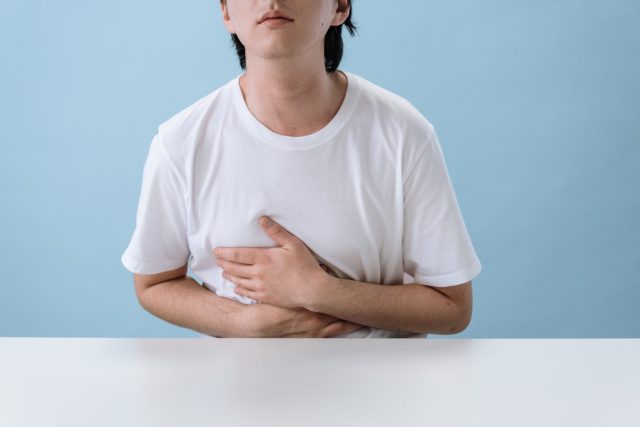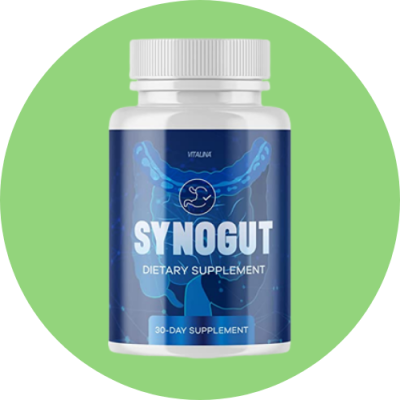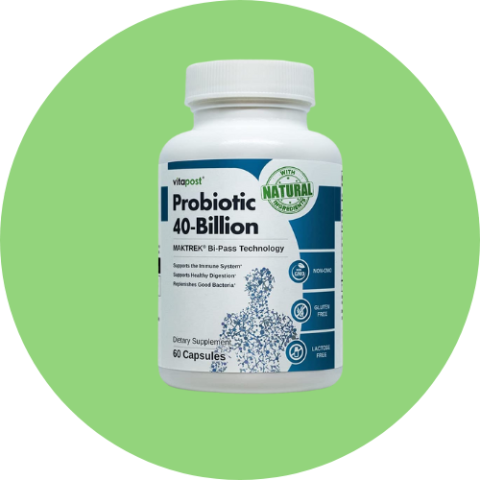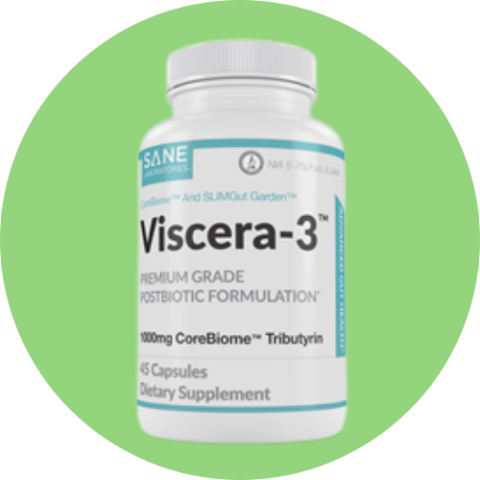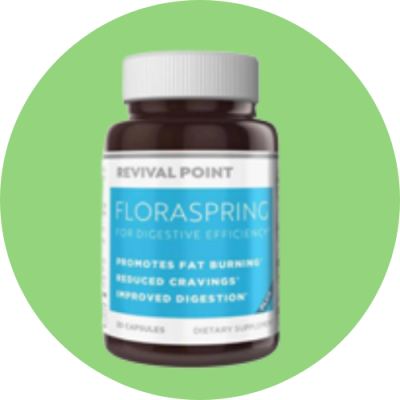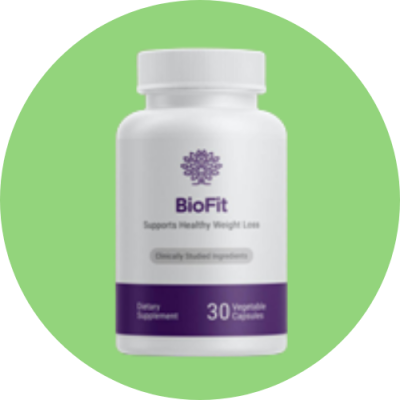5 Foods To Eat While On A Gastritis Diet: Complete Guide 2024
By Vanessa Richards
January 10, 2024 • Fact checked by Dumb Little Man
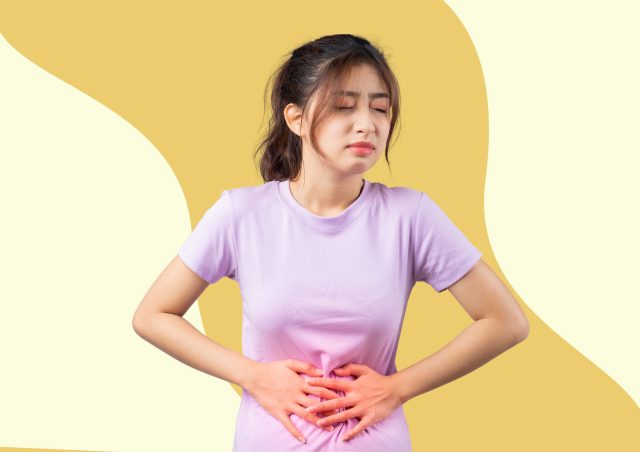
Can going on a gastritis diet help you treat gastritis? Can such a diet help you prevent gastritis altogether? Yes. If you learn how to ease gastritis symptoms on a day-to-day basis, you can prevent gastritis from taking a heavy toll on your digestive health.
Here’s an in-depth guide on identifying & addressing gastritis symptoms using simple & natural remedies.
Gastritis Diet: What is Gastritis?
Gastritis is one of the most common stomach conditions in the world. People who develop gastritis suffer from severe inflammations in their stomach’s protective lining.
This leads to burning stomach pain, stomach irritations, & various other digestive disorders. Thankfully, most patients develop acute gastritis or mild gastritis.
This mild form of gastritis affects 8 out of every 1000 people in the US & it can be treated relatively quickly (a few days/weeks). However, if acute gastritis is left unaddressed, it can become chronic gastritis. This chronic form of gastritis can lead to gastric ulcers, autoimmune disease, & digestive and kidney diseases.
In the US, approximately 15% of the population suffers from chronic gastritis. Chronic gastritis patients are highly susceptible to stomach cancer & stomach ulcers. That’s why addressing the early symptoms of gastritis is so important.
Gastritis Symptoms
Gastritis symptoms are similar to the digestive symptoms that patients with pernicious anemia & other digestive and kidney diseases experience. They include:
- Dizziness
- Fatigue
- Irritability
- Pain in the upper belly (gastritis pain)
- Feeling bloated
- Nausea
- Vomiting
- Allergic reactions to certain foods (e.g., experiencing stomach acid issues)
- Feeling full even when eating smaller meals
- Black-colored bowel movements
- Constant stomach irritation
- Loss of appetite
- Vomiting blood
- Unintentional weight loss
Gastritis symptoms typically come and go. Certain actions may aggravate symptoms (e.g., eating fried foods) whereas certain actions may provide temporary relief (e.g., taking pain relievers).
However, to successfully treat gastritis, you need to understand how this health condition evolves & impacts your digestive system.
What Causes Mild & Chronic Gastritis?
There’s a long list of potential causes. However, the most common cause of gastritis is a bacterial infection called “Helicobacter Pylori” or “h pylori.” H pylori bacteria is a type of bacteria that infects the gastrointestinal tract.
Approximately 50% of the world’s population has H pylori infections in their stomachs. However, most of these people don’t develop gastritis.
We don’t know why the h pylori bacteria only triggers gastritis in some people. But, recent studies suggest that some people just happen to be genetically predisposed to this bacterial infection.
In addition to h pylori infections, here are some other common causes of mild & chronic gastritis:
Alcohol Consumption
Excess alcohol consumption can erode your stomach lining & make you vulnerable to erosive gastritis – a form of chronic gastritis that often leads to more serious conditions like peptic ulcer disease.
Stress
Severe physical/mental stress can negatively affect the blood flow to your stomach. It can increase stomach inflammation & cause stress-induced gastritis.
Medication Abuse
Overconsumption of nonsteroidal anti-inflammatory drugs (NSAIDs) such as ibuprofen and other pain relievers can make you susceptible to autoimmune gastritis. In this form of chronic gastritis – the stomach’s protective lining gets permanently damaged by the nonsteroidal anti-inflammatory drugs.
Food Allergies
Certain foods like spicy foods, extra-fatty foods, or over-acidic foods can irritate & inflame the stomach lining and make you more susceptible to gastric acid issues.
Everyone is prone to stomach inflammation & gastritis when their digestive systems are under stress. That’s why, to reduce stomach inflammation & relieve symptoms of gastritis, you must change your eating habits.
Going on a gastritis diet can instantly ease gastritis symptoms & prevent them from becoming too painful.
What is a Gastritis Diet Plan?
Certain food items are known for causing gastritis. For example, we all know that spicy foods can aggravate inflammation in the stomach & damage stomach linings. Similarly, certain foods & diets can prevent gastritis. These diets are known as gastritis diets or anti-inflammatory diets.
Over the years, medical experts have identified food items that prevent excessive acid production in the stomach. So, a typical anti-inflammatory diet for chronic gastritis patients will be free from such foods.
Here are the food items that make gastritis symptoms worse:
- Meat products
- Sugary foods
- Alcohol
- Spicy foods
- Fried foods
- Large, carbohydrate-heavy meals
Smoking can also cause irreversible damage to your stomach lining & make you more prone to the risk of developing stomach ulcers & stomach cancer. People who have irregular mealtimes are also likelier to experience gastritis symptoms.
So, all of these food items & eating habits need to be cut off from your diet. That’s the first step of going on a gastritis diet plan.
5 Foods To Include In A Gastritis Diet For People Dealing With Stomach Ulcers
Chronic gastritis patients who are actively dealing with gastric ulcers & peptic ulcers have to maintain strict gastritis diets. These diets help them avoid sudden gastritis attacks. More importantly, they help them maintain a healthy weight & optimize their overall digestive health.
Here’s what a typical gastritis diet consists of:
1. Low-Acid, Low-Sugar Fruits & Vegetables
The main goal of a gastritis diet is to reduce stomach acid production. So, low-acid fruits & veggies like berries, apples, carrots, pumpkins, & bananas are staples in gastritis diets.
These low-acid & high-fiber fruits & veggies stimulate mucus production in the stomach. This mucus improves the quality of your gastric acid.
2. Whole Grains
Oats, barley, bread, brown rice, pasta, quinoa, & other whole grains are must-have foods for people with acute gastritis. That’s because they’re easy to digest & packed with fiber, which is vital for maintaining gastrointestinal tract health.
3. Low-Fat Dairy
Low-fat dairy products don’t irritate the stomach’s protective lining like full-fat dairy products. Instead, these food items contain healthy fats & probiotics that improve gut health.
Replace all of your full-fat dairy products with low-fat dairy products like low-sugar yogurt.
4. Healthy Proteins
Fatty red meats are packed with proteins. But, they can trigger gastritis & bile reflux. So, you must avoid these protein sources with safer options like lean meats, egg whites, & grilled seafood (not fried).
Similarly, avoid nuts and legumes. These protein-rich healthy fats can worsen symptoms of gastritis. Replace them with safer protein sources like leafy green veggies (cabbage, kale, spinach, etc.), almonds, walnuts, and oily fish (salmon, sardines, etc.)
5. Beverages
Your stomach produces more acid when it’s given heavy supplies of acidic juices & beverages. Going on a gastritis diet means cutting off all such drinks from your diet.
They include – caffeinated drinks, sugary drinks, acidic juices (e.g., orange juice), energy drinks, & all types of alcohol. These drinks must be replaced with low-fat, non-dairy milk, herbal tea, low-acid juices, & plain water.
A key part of going on a gastritis diet is eating on time. Having irregular meal times put your digestive system under great stress & causes stress-induced gastritis.
So, create a fixed eating schedule. Consider eating smaller meals & healthy snacks after periodic breaks throughout the day.
It’s a super-healthy eating habit that all chronic gastritis patients must nurture.
Gastritis Treatment
There are different ways to treat gastritis. The treatment depends on the severity of the condition & the underlying cause. Typically, medical experts provide the following types of treatments to gastritis patients:
- Cutting off inflammatory items like nonsteroidal anti-inflammatory drugs & alcohol from the diet.
- Proton Pump Inhibitors (PPIs) that reduce gastric acid production in the stomach & provide gastritis pain relief. Prilosec, Protonix, & Lansoprazole are some examples of prescription PPIs.
- For gastritis caused by harmful bacteria in the stomach, patients are given antibiotics. These medicines treat the underlying bacterial infection & serve as gastric acid reducers.
- Acid blockers are over-the-counter medications (e.g., Pepcid, Zantac, etc.) that can suppress stomach acid production.
Going on a strict gastritis diet is also a vital part of gastritis treatment. To do that, you don’t need professional help/assistance. You can create your all-natural gastritis diet at home.
Natural Remedies for Gastritis
Simple steps like not smoking, avoiding alcohol consumption, maintaining a healthy weight, & avoiding fried foods can help you manage & treat gastritis at home. If you still experience gastritis symptoms, you can try out these natural remedies at home:
Consume Garlic
Raw garlic can kill H pylori bacteria. If bacterial infections are causing gastritis, please add crushed or diced raw garlic to your daily diet.
Natural Probiotic Foods
Natural probiotic foods like yogurt, kimchi, & sauerkraut can drastically improve your digestive health. Healthful probiotic foods introduce beneficial bacteria to your gastrointestinal tract. These healthy bacteria help stop the spread of harmful bacteria like H pylori in the stomach.
Drink Green Tea
A recent study proved that drinking green tea on a daily/weakly basis can drastically reduce the presence of H pylori in the digestive & gastrointestinal tracts. Drinking warm, green tea can also aid digestion.
Honey & Essential Oils
Certain types of honey (e.g., manuka honey) have antibacterial properties. Adding them to your diet can help you avoid bacterial infections. The same goes for essential oils like clove, peppermint, & ginger.
Medications for Addressing Gastritis Symptoms
Antacids like magnesium hydroxide are the most commonly used medicines for treating sudden gastritis attacks. They can instantly neutralize gastric acid & decrease the amount of acid produced in the stomach. Some other commonly used medicines for treating acute & chronic gastritis include:
- Vitamin supplements (especially vitamin b12 supplements)
- Iron supplements
- Proton Pump Inhibitors
- H2 Blockers
While these medications can instantly reduce stomach inflammation & calm down stomach irritation, they don’t provide long-term results. For that, you’ll need to consume probiotic supplements that are packed with nutrients & beneficial bacteria. These products can improve your gut health & indirectly fortify your stomach’s protective lining.
The Best Probiotic Supplements
Probiotics are live microorganisms. Don’t worry, they’re 100% safe to consume. They can restore your gut bacteria & strengthen your stomach’s protective lining. Several studies have proved that healthful probiotic foods can improve digestive health & reduce stomach inflammation.
These food items include – yogurt, buttermilk, sourdough bread, cottage cheese, & miso soup. The problem is that these probiotic foods don’t contain enough probiotics & contain way too much fat.
They can derail your weight loss goals. That’s where probiotic supplements can be extremely helpful.
Adding probiotic supplements to your gastritis diet is the perfect way to introduce beneficial bacteria to your gastrointestinal tract. This “good” bacteria can stop the spread of bad, H pylori bacteria in your stomach. It can also transform your gut health.
Here are the most highly-rated probiotic supplements in the market:
1. Best Prebiotic and Probiotic Supplement: Synogut
SynoGut is a relatively new product in the probiotic supplements market. But, it has garnered a huge user base in a short space of time because of its instant effectiveness. This supplement comes packed with probiotics, herbal laxatives, anti-inflammatory ingredients, and detoxifying substances.
These ingredients combine to eliminate all the dangerous pollutants in the stomach – including H pylori bacteria. Ingredients like psyllium, bentonite clay, flax seeds, Aloe Vera, & prune fruit help enhance digestion. The better your digestion, the quicker it eliminates the toxins that stress out the stomach.
SynoGut also contains Acidophilus – a highly effective probiotic that’s known for promoting the growth of healthy, beneficial bacteria in the gut. Overall, this digestive health supplement is a safe, proven, & effective product that can boost your daily gastritis diet.
Each SynoGut bottle contains 60 tablets. Taking two pills a day (one after each meal) is a good way to boost your stomach health.
Shop at Synogut Official Website
Full Article: SynoGut Reviews: Does it Really Work?
2. Ensures A Healthy Gastrointestinal Tract: VitaPost Probiotic 40-Billion
Each capsule of this probiotic supplement contains 40+ billion live probiotic cells. That’s why the name Probiotic 40-Billion. Needless to say, this supplement is quite popular among chronic gastritis patients.
The probiotic bacteria found in this supplement are special. They’re Colony-Forming Units or CFUs.
That means this probiotic supplement can help you establish colonies of healthy bacteria in your gut. Avoiding bacterial infections becomes much easier when there are so much beneficial bacteria in your gut!
Lactobacillus Paracasei, Lactobacillus Acidophilus, Bifidobacterium Lactis, & Lactobacillus Plantarum are some of the good bacteria found in this supplement.
All the other ingredients are 100% natural. Overall, Probiotic 40-Billion is a safe & easy-to-consume probiotic supplement that can transform your digestive functions & gut health.
Shop at Vitapost Probiotic Official Website
Full Article : Vitapost Probiotic 40-billion Reviews 2024: Does it Really Work?
3. Best For Gas and Bloating: Sane Viscera
Manufactured by the famous SANE Labs, Viscera-3 is a relatively new probiotic supplement in the market. But, it deserves a spot on this list because it was specifically created for people struggling with stomach & kidney diseases. This supplement contains Core-Biome Tributyrin – a patented tributyrin of SANE Labs.
This short fatty acid feeds the good, beneficial bacteria that already exist in your gut. Once these good bacteria increase in numbers, you don’t have to worry about addressing the symptoms of gastritis all the time.
The good bacteria in your gut will do that for you. Viscera-3 also contains a variety of anti-inflammatory ingredients like grape-seed extracts, pomegranate fruit extracts, magnesium, & microcrystalline cellulose. They all combine to reduce stomach inflammation.
Shop at Viscera-3 Official Website
Full Article : Viscera 3 Reviews: Does it Really Work?
4. Best Probiotics with Super Strains: Flora Spring
FloraSpring is another popular probiotic supplement. It contains 25+ billion active strains of probiotics, including the likes of lactobacillus acidophilus, lactobacillus fermentum, Bifidobacterium breve, Lactobacillus Plantarum, & streptococcus thermophilus.
They all combine to help reduce stomach inflammation, boost gut health, and improve digestive functions.
Shop at FloraSpring Official Website
Full Article : FloraSpring Probiotic Review: Does it Really Work for Weight Loss?
5. Best for Probiotic Weight Loss: BioFit
BioFit is a well-established name in the probiotic supplement market. Thousands of people across the globe use it every day to reduce bloating/gas, increase their energy levels, & boost their immune systems.
BioFit contains 100+ billion colony-forming units (CFU) of beneficial bacteria. These probiotic microorganisms combine to boost gut health & regulate acid production in the stomach. Adding one or two capsules of BioFit to your daily gastritis diet can transform your digestive health.
Shop at Biofit Official Website
Full Article: BioFit Reviews: Does it Really Work?
Conclusion
Early treatment can drastically improve the outlook of chronic gastritis, even if the treatment is done at home. If you’ve experienced gastritis symptoms in the past, don’t take any risks. Go on a gastritis diet now & start actively monitoring your digestive health.
Like most good things in life, our digestive health only worsens with time. So, don’t wait for this digestive disease to become chronic. Start eating right & consider adding probiotic supplements to your diet. Let’s fight gastritis one day at a time!
Gastritis Diet FAQs
What foods are good for gastritis?
Low-acid, low-sugar, & low-fat foods are the safest food items for gastritis patients. Consuming anti-inflammatory food items can even help treat the symptoms of this disease.
What is the fastest way to cure gastritis?
Making the right dietary modifications & taking the right probiotic supplements – that’s the quickest way to correct the deficiencies in your stomach’s lining. Taking antibiotic drugs can also help.
What foods heal the stomach lining?
Healthful probiotic foods like yogurt, kimchi, & sauerkraut can heal your stomach’s protective linings.
Can you heal gastritis with diet?
Yes. Eliminating inflammatory foods from your diet & replacing them with healthy, anti-inflammation foods can help treat gastritis.
Vanessa Richards
Vanessa is a mom of 3 lovely children and a software geek. Outside of her career as a health and wellness instructor. She enjoys writing and researching on topics such as finance, software, health and culinary.

